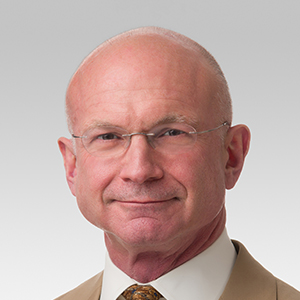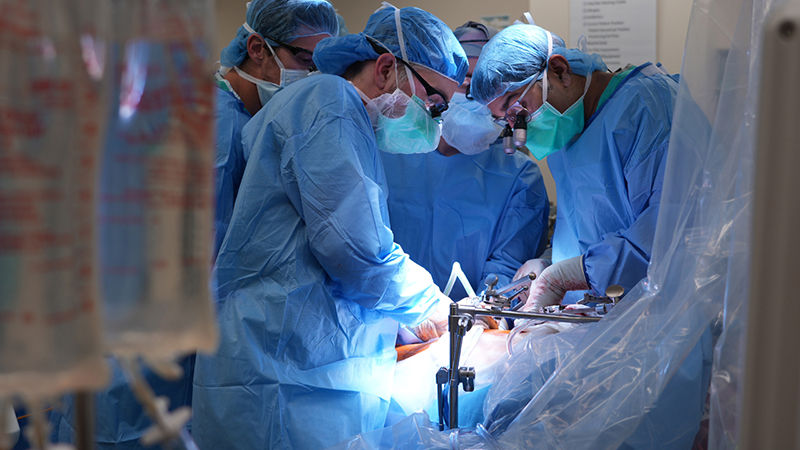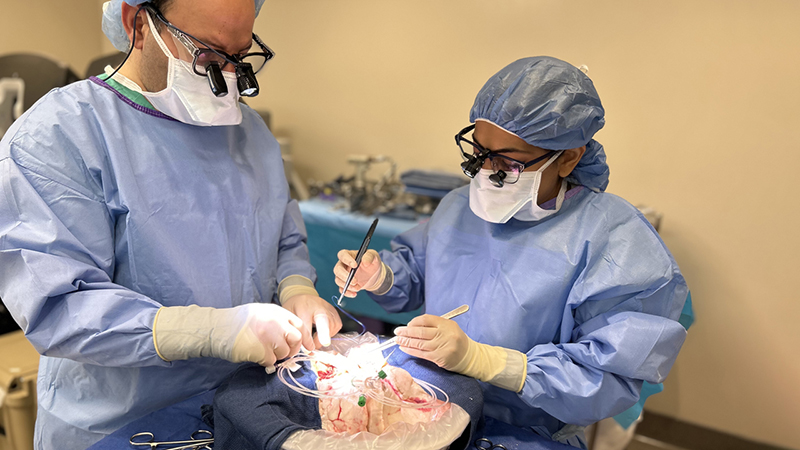Chronic Sinusitis and Nasal Polyps: Diagnosis and Treatment
Collaborative Care Expands Nonsurgical Treatment Options
Updated January 2023
Each year, more than 28 million people are diagnosed with sinusitis in the U.S. As many as 10% of these people experience persistent sinus inflammation that never completely goes away. This is known as chronic sinusitis or chronic rhinosinusitis. Robert C. Kern, MD, Northwestern Medicine otolaryngologist and head and neck surgeon, discusses treatment options that can address the root issues and bring relief.
Chronic Sinusitis and Polyps
Sinusitis occurs when inflammation in your sinuses (air-filled pockets in your face) causes symptoms. Symptoms can be a combination of:
- Nasal blockage
- Postnasal drip (mucus dripping down the throat)
- Facial pressure
- A toothache
- Headaches
- Ear pain
If these symptoms last for more than 12 weeks, you may have chronic rhinosinusitis. Fluid can get trapped in the sinus cavities, causing an acute infection. You may also develop a type of chronic rhinosinusitis that grows nasal polyps. These growths occur in your nasal passageways or sinuses. Dr. Kern compares nasal polyps to weeds.
"Nasal polyps will grow back, so specific treatment is available to address this problem," he says.
Dr. Kern sees patients at The Sinus and Allergy Center of Northwestern University at Northwestern Memorial Hospital, where patients have access to a multidisciplinary team. "Here, we use leading-edge treatment and work very closely with allergists to provide comprehensive care."
Treatment — and Antibiotic Overuse
Antibiotics are often the first line of defense to treat sinus infections but most sinus infections are caused by a virus, which can't be treated with antibiotics.
"Antibiotics kill bacteria, but most of these cases do not actually require antibiotics," explains Dr. Kern. "This results in overuse. Most don't benefit from this type of treatment."
Additionally, misdiagnosis or self-care tactics may prevent or prolong healing. For example, taking antihistamines can thicken mucus, making symptoms worse. Instead, it's important to understand the cause of the issue, such as:
- Allergies
- Viral or bacterial infection
- Abnormal nose structure
- A weakened immune system
- Cystic fibrosis
"We need to understand what kind of inflammation is occurring. Then, we can better identify what products can help provide relief," says Dr. Kern.
Nonsurgical Treatment Options
Oral corticosteroids and nasal corticosteroid sprays are often used to treat nasal polyps. Corticosteroids that you take by mouth have significant side effects so they should be used sparingly.
Corticosteroid sprays are available with a prescription and over the counter; they deliver medicine into your nasal passages, addressing the issue directly. In most cases, they can be used for many years without significant side effects. Clinical trials have shown that corticosteroid sprays reduce nasal congestion and nasal polyps. Before using a nasal corticosteroid spray, talk with your physician or advanced care provider to confirm that you have nasal polyps.
If you have both nasal polyps and chronic rhinosinusitis, you may be a candidate for one of three injectable medications approved by the U.S. Food and Drug Administration: omalizumab, mepolizumab or dupilumab. These medications are injected every two to four weeks. They can provide dramatic relief from nasal obstruction and smell loss, while reducing the size of polyps. Your physician can administer them in the office, or you can self-administer at home.
Surgical Treatment for Sinus Conditions
Surgical procedures can also help you breathe easier. Your physician will determine the source of the disruption to identify the appropriate treatment for you.
Options may include:
- Traditional sinus surgery, which involves removing diseased sinus tissue and improving sinus drainage. This is usually performed in an operating room under general anesthesia for moderate to severe chronic rhinosinusitis. Sinus surgery is often key to treating severe sinusitis.
- Minimally invasive balloon sinuplasty, which expands the natural drainage openings of the passages. This procedure can often be performed in the office under local anesthesia for milder forms of rhinosinusitis.
- A sinus implant, which can be an option for adults who have previously had endoscopic sinus surgery. Implants open in the sinus cavity to deliver anti-inflammatory medicine over a certain period of time. The treatment can be done in an outpatient setting and typically requires minimal anesthesia.
Leading-Edge Sinus Care
In partnership with the Division of Allergy and Immunology, Northwestern Medicine Otolaryngology received an $8.4 million research grant from the National Institutes of Health (NIH) to study all aspects of chronic rhinosinusitis. This collaboration and evolving research may pave the way for new and innovative treatments.
With so many options, it's important to have a collaborative team to develop a treatment plan that meets your individual needs, says Dr. Kern. "Our whole team works together to individualize your treatment," he explains. "We provide a complete, state-of-the-art evaluation and are undergoing extensive research in this field. It's a truly talented team."






